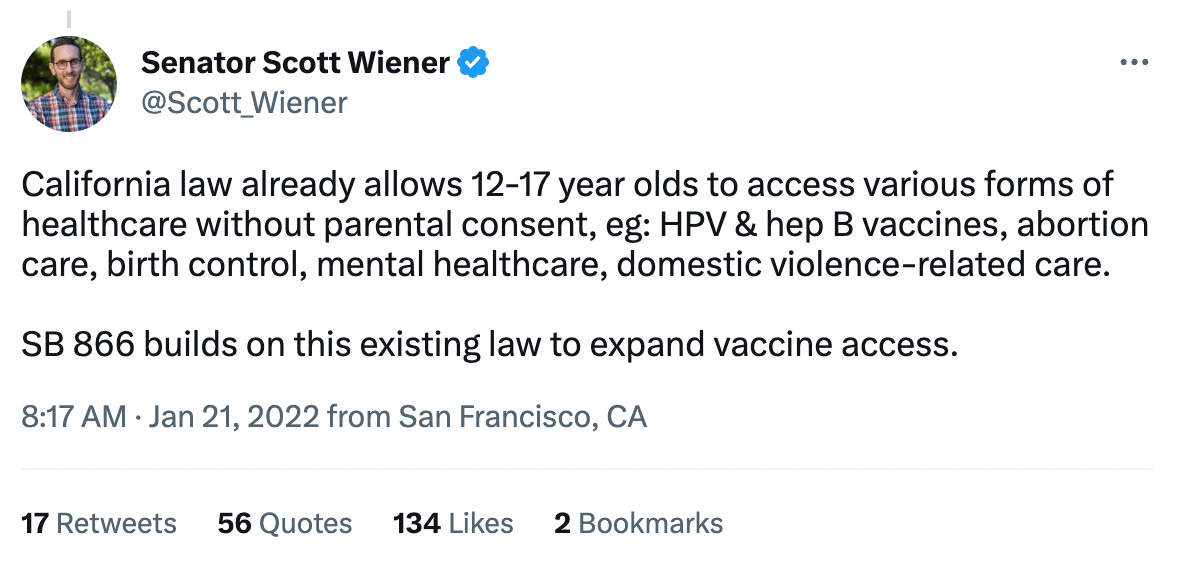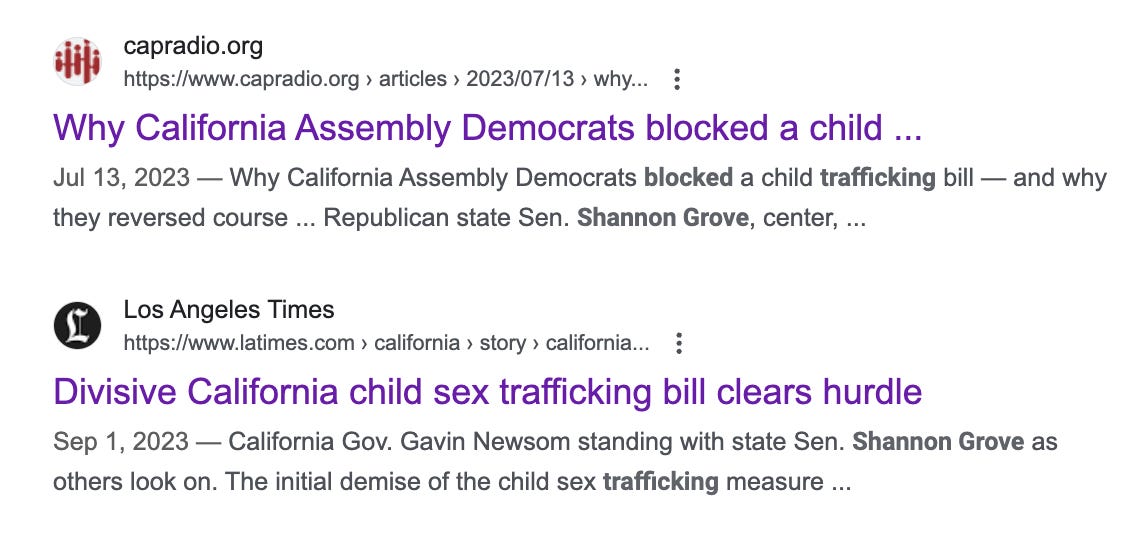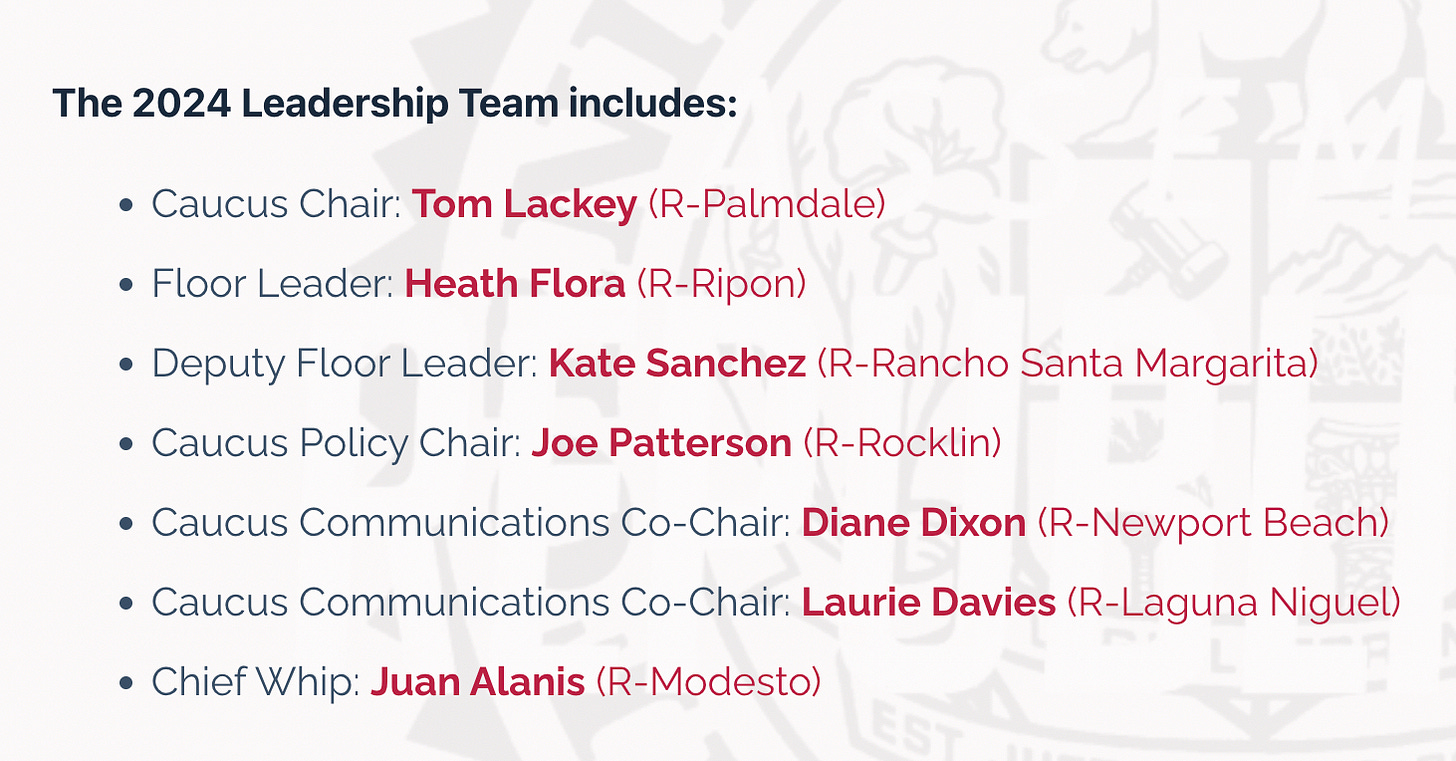Still Fighting: A Discussion With California Assemblyman Bill Essayli
Not giving up.
California is all-in on the sexualization of childhood, the consistent theme of the last few legislative sessions. The Democratic supermajority has passed bills to allow 12 year-olds to leave home without parental consent to get support with “mental health” problems (like transitioning to their newly declared gender) in residential care facilities, to require judges to deny custody to parents who don’t affirm a child’s gender transition (a bill that was uncharacteristically vetoed by Governor Patrick Bateman), to protect student access to sexually explicit curriculum in K-12 schools, and to require those schools to keep discussions with children about sexual identity and sexual behavior a secret from parents.
Democratic legislators proudly remind us that 12 year-olds can get abortions, birth control, and medical treatment for intimate-partner violence without mommy and daddy finding out, because it’s very progressive for middle school students to take a lover who might occasionally hurt them:
The great unifying premise of this daily assault on the parent-child connection is the certainty that family is a site of great danger — the most serious threat to the wellbeing of a child. Parents can’t help their children. Only credentialed members of the helping professions can safely care for a young person. Children grow up to be mentally healthy only when they obtain mental health services.
Lacking the numbers to impede the Democratic supermajority, California Republicans have tended toward the posture of sad-sackery; most famously, Senator Scott Wilk advised families to run away and “move to America.” The fight is lost. Retreat is the only option.
Elected in legislatively insignificant numbers, Republican legislators in California tend to keep their heads down and work on inoffensive bills. Senator Diane Dixon, a Newport Beach Republican, is making real progress on her effort to name the abalone shell as the official state seashell.
But there are exceptions. Senator Shannon Grove, a Bakersfield Republican, used relentless public shaming to overcome Democratic objections to her bill increasing the penalties for the sexual trafficking of children — a “divisive” bill, the Los Angeles Times warned, before stealth-editing the headline.
More recently, Assemblyman Bill Essayli was badly harmed by his effort to strip sanctuary state status from people convicted of sex crimes against children. Appalled by Essayli’s divisive cruelty to pedophiles, Assembly Speaker Robert Rivas took away his most significant committee membership, reducing his already limited power in the legislature.
Essayli’s other punishment wasn’t noticed as widely. In 2023, Essayli was named the deputy floor leader of the Republican Assembly caucus; in 2024, he no longer holds that title:
He tried to take sanctuary state status from convicted pedophiles, so he was punished by Republicans, in a legislature that sometimes responds to Essayli by simply turning off his microphone during debate.
I talked to Essayli by phone, this week, to see how he was holding up against the rising tide of insider disapproval. Short answer: he’s just fine.
If you want to understand what’s happening in the California Assembly and Senate, Essayli says, start by looking at political consultants and the “third house” of the state legislature: the lobbyists. Legislators coast on easy money; Democratic incumbents get low-effort contributions from organized labor, and Republican incumbents get the same from industry groups. “They don’t raise money from their districts,” Essayli says. They raise money from Sacramento, which implies a very different set of incentives. So Republicans are generally powerless, but they’re also comfortable. They’ve figured out a way to persist as a fake opposition party, gesturing at disagreement but cashing the checks that show up whether they win or lose on the floor.
But for Essayli, who decided to run for a legislative seat because of his distaste for a “useless, dysfunctional Republican party,” fake opposition is a waste of time. “We have losers,” he says. “We have people who don’t want to win.” He compares many Republican elected officials in California to prisoners of war who are sucking up to their captors “so they can get an extra scoop of ice cream.”
Legislators are controlled by their ambition and their appetites. When a newly elected member arrives in Sacramento, he’s offered a generous amount of help from lobbyists and political leaders who ask him what he wants: leadership role? higher profile? seat in Congress? But all the forms of easy help are levers, tools for manipulation. Legislators who decline the assistance are…confusing. Independence is an outlier.
Republicans don’t have a foreseeable path back to the majority in California, Essayli concedes, but they do have a real near-term chance to break the Democratic supermajority. They can become a substantial obstacle to the most radical pieces of the majority party’s agenda. But the party — in the form of the state GOP organization, and in the form of legislative leaders — has a “scarcity mindset.” They’re not trying to flip seats and grow; they’re trying to hold seats and not shrink.
Supermajority status is a threat; a powerful party can harm Republicans who won’t play along, as Essayli discovered with his committee assignments. You can still pass some bills as a Republican in California, unless you disagree too much. “Nobody wants to fight, because nobody wants to expose themselves to the wrath of the Democrats.”
Republicans mostly decline to offer aggressive resistance to the Democratic sexualization of childhood, Essayli says, because the party’s political consultants identify it as a losing issue. They do polls, and voters say they’re worried about economic issues, taxes and crime. And they are, but the landscape of voter concerns is being shaped by the Republican refusal to fight. When Californians are educated about the Democratic effort against parents and families, Essayli says, they care about it. “It’s an issue that moves voters.” If the issue is brought to their attention, and kept in the foreground. The problems of framing are delicate, but it can be done — by a party that isn’t guided by fear-driven “professional losers.”
Essayli sees some cause for hope in the current election cycle, with strong Republican candidates contesting seats in meaningful ways: Tenessa Audette in AD 1, Carl DeMaio in AD 75. And he recently appeared at a fundraiser for Ron Edwards, the Republican candidate in AD 60 who’s challenging the relentlessly appalling Corey Jackson. But Republican voters in California have to see the task ahead of them to succeed at it: the fight is for the soul of the GOP first, then for the future of the state.
“We are not going to change Sacramento from the inside,” he says. “It’s going to have to be a hostile takeover of the caucus and the party.”
Hopelessness is destroying California’s future, Essayli warns, as Republicans conclude they can’t succeed in the state and withdraw from a fight they assume they’ve already lost. “We have a lot of Republicans who sit on the couch,” he says. “The left have gotten us to self-suppress.” And quitting makes the future a dark certainty.
“When people decide to fight,” Essayli says, “we’ll win again.”






Chris, once again I applaud you for doing the work most of us don’t do. Essayli is obviously one of the only sane people in Sacramento and I hope this exposure helps him.
We can’t all leave. If all the sane people leave, we leave behind a hell on earth for those who stay in Kommiefornia. I’ve thought of leaving, but my wife won’t do it, so we have to educate ourselves and our kids against the evil that is the California legislature.
"because the party’s political consultants identify it as a losing issue. They do polls, and voters say they’re worried about economic issues, taxes and crime. And they are, but the landscape of voter concerns is being shaped by the Republican refusal to fight."
I can still remember the odious Karl Rove back since the 1990's telling republicans not to waste time on culture battles, including abortion. Decades later consultants like him have made certain that we have a submissive uniparty across the country at all levels of government, in both red and blue states. A real pleasure for corporatists, bankers and the legion of immoralists everywhere. Clearly the priority is not for the welfare of children but for an open door for their abusers
People of principal who run and are elected should exercise their moral muscles regularly in order to strengthen them and should steer clear of the kind and mild poison cup of cowardice. Citizens and voters should do likewise.